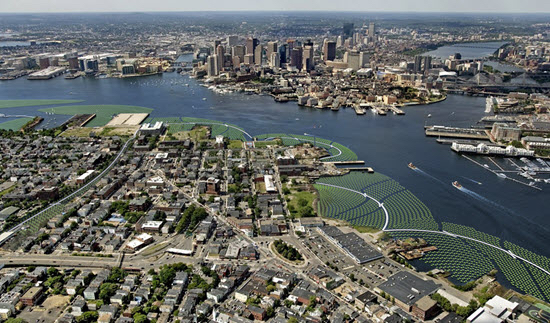A sustainable, climate-change-resilient floating landscape infrastructure took the top prize of the American Society of Civil Engineer’s latest Innovation Contest.
The winner, Emerald Tutu, provides a floating waterfront infrastructure that provides a city with an inhabitable waterfront amenity while mitigating the effects of climate change. “The contest is a springboard for forward-looking infrastructure ideas and aims to identify cutting-edge ideas from civil engineers, including students, educators, practitioners, and project managers,” according to an ASCE news release.
Another concept, “Smart Walls: Telescopic Structural Walls for Flood Protection,” also addressed climate resiliency. Smart Walls are deployable walls that are hidden in the ground and extend telescopically when needed to stop floodwaters.
The winner in the Best Student Submission category: “Rapid Restoration of Deteriorated Pre-stressed Concrete Bridges Using Mechanically Fastened Fiber Reinforced Polymer,” addressed deteriorated pre-stressed concrete bridge superstructure. It proposed a method to extend the useful life of infrastructure at low cost.
The Emerald Tutu from Very Flat on Vimeo.
Related Stories
| Aug 25, 2022
New York City’s congestion pricing aims to reduce traffic, cut carbon
Officials recently released an environmental assessment that analyzes seven different possible pricing schemes for New York City’s congestion pricing program.
| Aug 23, 2022
New Mass. climate and energy law allows local bans on fossil fuel-powered appliances
A sweeping Massachusetts climate and energy bill recently signed into law by Republican governor Charlie Baker allows local bans on fossil fuel-powered appliances.
| Aug 22, 2022
Gainesville, Fla., lawmakers moved to end single-family zoning
The Gainesville City Commission recently voted to advance zoning changes that would allow duplexes, triplexes, and quadplexes to be built on land currently zoned for single-family homes.
| Aug 16, 2022
DOE funds 18 projects developing tech to enable buildings to store carbon
The Department of Energy announced $39 million in awards for 18 projects that are developing technologies to transform buildings into net carbon storage structures.
| Aug 11, 2022
Report examines supposed conflict between good design and effective cost management
A report by the American Institute of Architects and the Associated General Contractors of America takes a look at the supposed conflict between good design and effective cost management, and why it causes friction between architects and contractors.
| Aug 10, 2022
U.S. needs more than four million new apartments by 2035
Roughly 4.3 million new apartments will be necessary by 2035 to meet rising demand, according to research from the National Multifamily Housing Council (NMHC) and National Apartment Association.
| Aug 9, 2022
Work-from-home trend could result in $500 billion of lost value in office real estate
Researchers find major changes in lease revenues, office occupancy, lease renewal rates.
Legislation | Aug 8, 2022
Inflation Reduction Act includes over $5 billion for low carbon procurement
The Inflation Reduction Act of 2022, recently passed by the U.S. Senate, sets aside over $5 billion for low carbon procurement in the built environment.
Legislation | Aug 5, 2022
D.C. City Council moves to require net-zero construction by 2026
The Washington, D.C. City Council unanimously passed legislation that would require all new buildings and substantial renovations in D.C. to be net-zero construction by 2026.
| Aug 4, 2022
Newer materials for green, resilient building complicate insurance underwriting
Insurers can’t look to years of testing on emerging technology to assess risk.

















